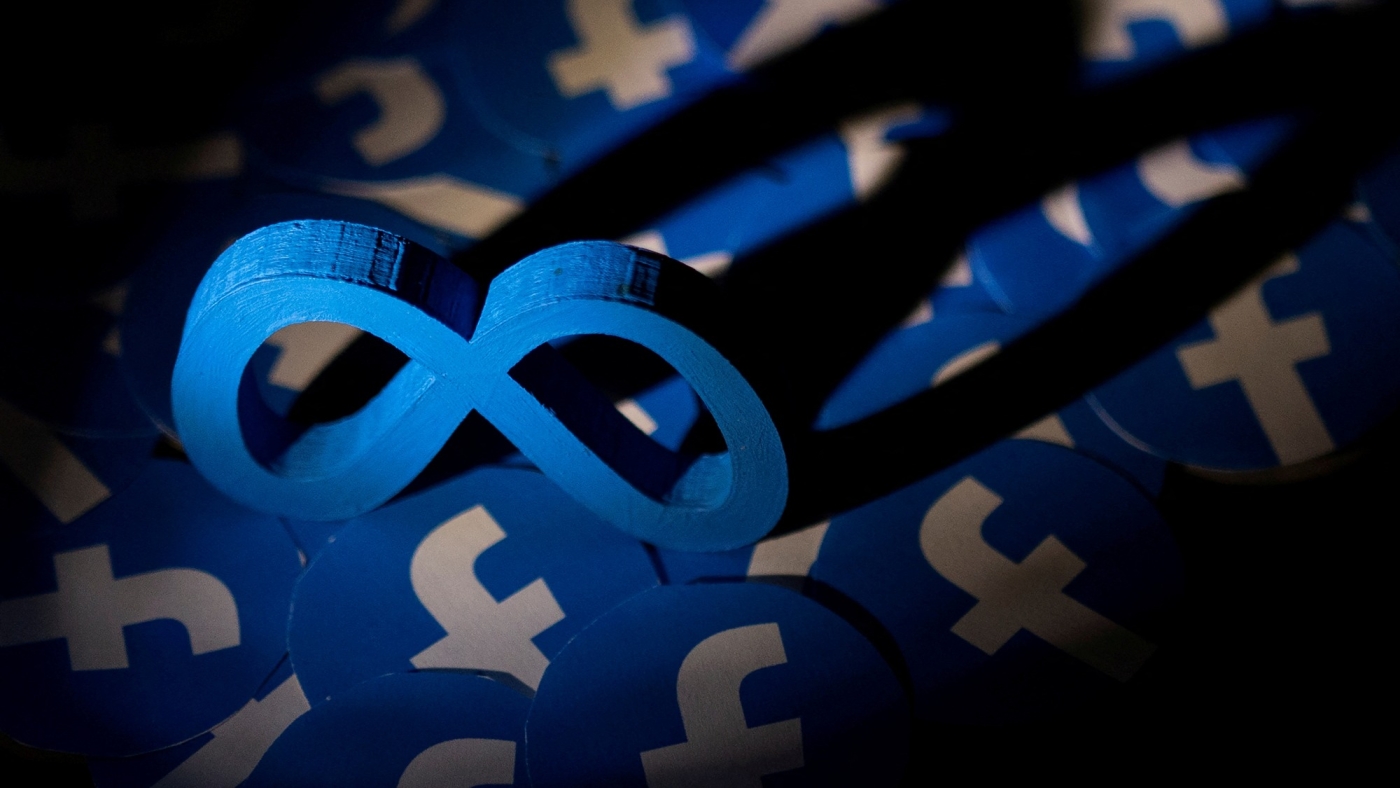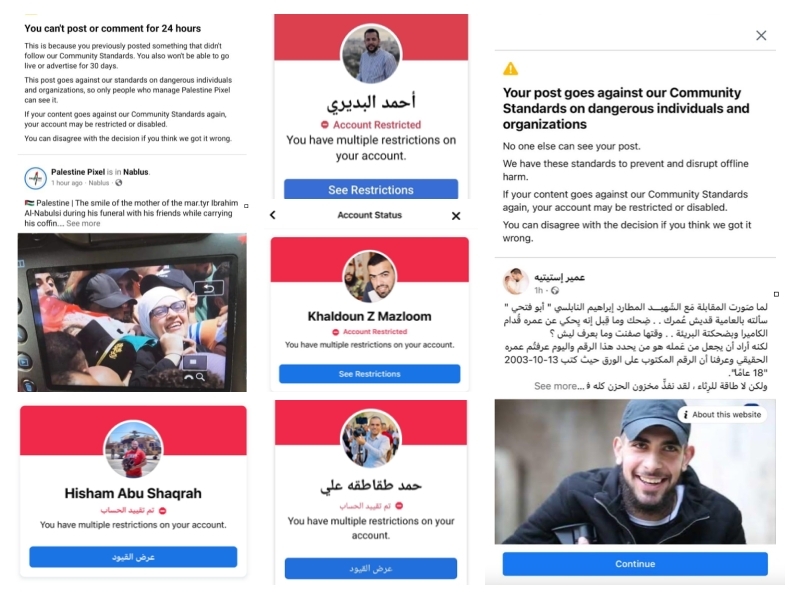Parent company of Facebook and Instagram is accused of censoring posts about the killing of Palestinian resistance figure Ibrahim al-Nabulsi


Social media giant Meta has been censoring posts referencing the recent killing of a prominent Palestinian resistance fighter, mainly targeting journalists based in the occupied West Bank and Jerusalem, activists claim.
Ibrahim al-Nabulsi, a senior commander of Fatah’s al-Aqsa Martyrs Brigade, was killed on 9 August by Israeli forces during an army raid in the occupied West Bank city of Nablus and subsequent exchanges of fire, along with Islam Sobhi and Hussain Jamal Taha.
Images of Nabulsi went viral following the news of his death. Yet, a number of Palestinian journalists and activists who shared photos and videos of Nabulsi said their posts were banned on Meta-affiliated social media platforms.
They said Instagram and Facebook began deleting and censoring photos of the “martyrs” and their families following the killings. Posts that mentioned Nabulsi, Sobhi and Taha were blocked, as well as any content that mourned their death.
‘Israel has been punishing users who post Palestinian-related content by reducing and limiting their engagement and interaction’
– Aseel Sulieman, Palestinian journalist
Meta also censored videos of Nabulsi’s mother speaking to crowds and carrying her son’s body during his funeral.
Meta Inc owns Facebook, the world’s largest social media website, as well as the popular apps Instagram and WhatsApp.
According to Sada Social, an initiative that records and monitors the suspension of Palestinian content and accounts on social media platforms, the Meta campaign mainly targets journalists and activists based in the occupied West Bank and Jerusalem.
Its data showed that within 24 hours of Nabulsi’s death, at least 75 activist and journalist accounts were restricted or deleted on various social media platforms, including Facebook, Instagram, TikTok and Twitter.
‘Double standards’
Sada Social also claims that Meta has “double standards’ when it comes to content censorship.
“It launched an intensive campaign against Palestinian journalists by restricting [social media] posts reporting breaking news from Palestine, but it did not restrict the Israeli forces’ video showing them raiding Nablus and killing Palestinians,” Nidaa Bassoumi, the media coordinator at Sada Social, told Middle East Eye.
According to Bassoumi, Meta has been restricting references to various figures and concepts associated with the Palestinian resistance as “violating community standards,” including the Palestinian prisoners who escaped from Israel’s Gilboa prison in 2021 and now Nabulsi.
The practice is nothing new, Bassoumi pointed out, as an agreement has been in place since 2016 between the Israeli government and major social media platforms, including Facebook, to control Palestinian content.
Palestinian contents on social media is also closely monitored within Israel. As of April 2022, the Israeli cyber unit received complaints on 5,815 social media posts by Palestinian users that had been accused of online incitement or support for “terrorism”.
“Imagine Instagram deleted a journalist’s Instagram account because she posted a photo of a Palestinian killed by Israeli forces,” Bassoumi said.
Silencing Palestinian voices
Palestinian journalist Aseel Sulieman‘s Instagram account was suspended after he posted three photos of Nabulsi and a video of Palestinians and Israeli special forces exchanging fire.
Sulaiman, who has more than 51,000 followers on the image-sharing app, was accused of violating the “Community Guidelines” for posting photos of Nabulsi, and his account was no longer visible to Instagram users.

Meta-owned platforms such as Facebook and Instagram.
“Israel has been punishing users who post Palestinian-related content by reducing and limiting their engagement and interaction,” Suliman told MEE.
Sulieman said that during the Israeli bombardment of Gaza last week, in which at least 44 Palestinians were killed and more than 360 were wounded, she noticed her Instagram account’s engagement and reach had been restrained. However, the suspension of her account came as a surprise.
“In other words, they use the ‘feel free to post about Palestine’ tactic with some accounts, but at the same time they also limit the reach of the content,” said the Roya TV news reporter.
“I thought I would grieve the loss of my 51K Instagram account to be honest, but the death of three Palestinian heroes was my real loss. I can always start a new Instagram account, but how will Palestine revive the souls of the three freedom fighters who were brutally killed by Israeli?”
‘Digital massacre’
Under Meta’s censorship, Abdalafo Bassam‘s 436,000 Instagram followers pose little value these days.
‘I am one of the victims of the digital massacre by Meta… This is a digital Israeli aggression”
– Abdalafo Bassam, who has 436,000 followers on Instagram
“I am one of the victims of the digital massacre by Meta,” Bassam, one of the most prominent activists from Jerusalem during the Sheikh Jarrah and Gaza 2021 aggression, told MEE.
“This is a digital Israeli aggression. While Palestinians on the ground are injured by bullets and shrapnel, we are wounded online by restricting and silencing our voices,” he said.
Bassam joined Instagram and Facebook in 2010, and he highlighted how the algorithms have evolved over time to suppress Palestinian content.
Despite attempts to bypass censorship on Facebook by stripping out phrases such as “Shahid, Muqawameh” (martyr, resistance), Bassam said he had previously been barred from posting stories, pictures, and videos on the website.
For months, he had been barred from using Instagram Live, the app’s livestream feature.
A photo showing Nabulsi’s mother smiling as she held her son’s body at his funeral with the caption: “A great mother, holding [her son],” was removed from his Instagram account.
“I did not mention Nabulsi, I mentioned his mother was great, so how did I violate Instagram’s rules?” he asked.
Instagram accused Bassam of using the platform to promote “terrorism”.
During the first half of 2022, Sada Social Center documented around 425 digital violations against Palestinian content on social media.
Mind Force, an Israeli PR firm now banned from Meta platforms, had spent about $12,000 on Facebook and Instagram ads and reportedly ran anti-Hamas political campaigns in the Gaza Strip.
Some of its accounts posed as freelance local journalists, the vast majority of the profiles used pictures stolen from other sites, and a few appeared to have been made with artificial intelligence.
These pages and accounts bought fake “likes” to make their content appear popular and followed.
The group was identified in the Facebook Quarterly Adversarial Threat Report released in August 2022 as part of a network “originated in Israel and targeted Angola, Nigeria and the Gaza region in Palestine”.
Facebook said it removed over 250 Facebook accounts and over 100 Instagram accounts for violating its policy against “coordinated inauthentic behaviour”.